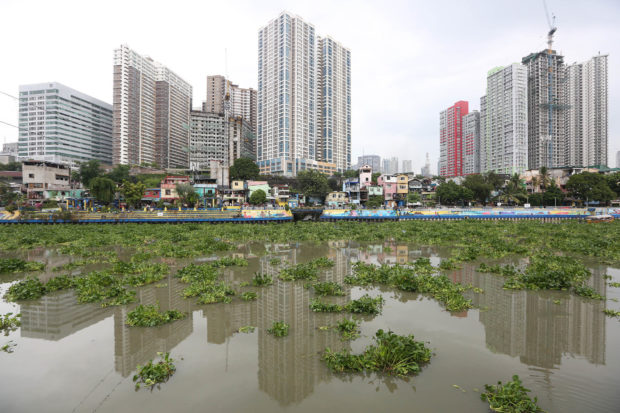MANILA, Philippines — The proposed Pasig River Expressway (PAREx) would contribute to more heat in Metro Manila, a scientist group said, as it urged the government and the project’s proponents to rethink the construction of the elevated expressway.
Advocates of Science and Technology for the People (Agham) added its voice to those opposing the project, stressing that the road would cause further damage to the river, nearby residents and the overall urban ecosystem in the National Capital Region.
Decrying the lack of public green spaces in the capital region, the group said the areas near the Pasig River, which winds through different cities, would be a good places to invest for green spots in Metro Manila instead.
“However, the length of the river will be full of supporting structures, ramps, tollgates and connecting roads once PAREx commences its construction,” Agham said in a statement. “The river vicinity that could be a very good urban heat sink could be a further source of our cities’ heat.”
Agham, a national organization of scientists, researchers, engineers, and science educators and advocates, said PAREx would affect the river’s productivity.
“Complete or partial blocking of the natural sunlight will affect the remaining food chain of Pasig River,” it said. “From the tiniest plankton to the remaining fish species and riparian vegetation, all organisms will be affected by the drastic alteration of the river’s illumination.”
The group also called on the project’s proponent San Miguel Corp. to stop claiming Pasig River to be “biologically dead,” which it says undermines the rehabilitation efforts by individuals and government institutions to revive the river.
“The Pasig River Expressway is a 19.37-kilometer-long death sentence that will kill the hopes for a better Pasig River ecosystem,” the group said. “Calling a certain body of water ‘dead’ does not warrant big corporations’ interest to build more infrastructure to satisfy their bottomless profit thirst.”
The P95-billion project will build a six-lane elevated expressway, from Radial Road 10 in Manila to C6 Road or the South East Metro Manila Expressway in Taguig.
Nearly 80 civil society organizations had earlier thumbed down the project, saying that the harm from PAREx will “far outweigh any projected benefits” touted by the project proponents, such as solving the traffic problem in the Metro.
“Restoring a river does not mean building an expressway over it,” Agham said, adding that rehabilitating a waterway requires a multidisciplinary approach, from ecological restoration technologies to solid waste management plans and legislative measures.
Pasig River was declared by ecologists as “biologically dead” in the 1990s. But numerous government and private efforts to clean up and rehabilitate the waterway has led to its slow revival.
Efforts of the Pasig River Rehabilitation Commission, created in 1999, bore fruit, with residents seeing signs of life in the 27-km watercourse in recent years. In 2018, the river was conferred with the inaugural Asia Riverprize award for the significant restoration, protection and management done in the waterway.
President Duterte, however, abolished this commission in 2019, and tasked the Inter-Agency Manila Bay Task Force to rehabilitate the river.


